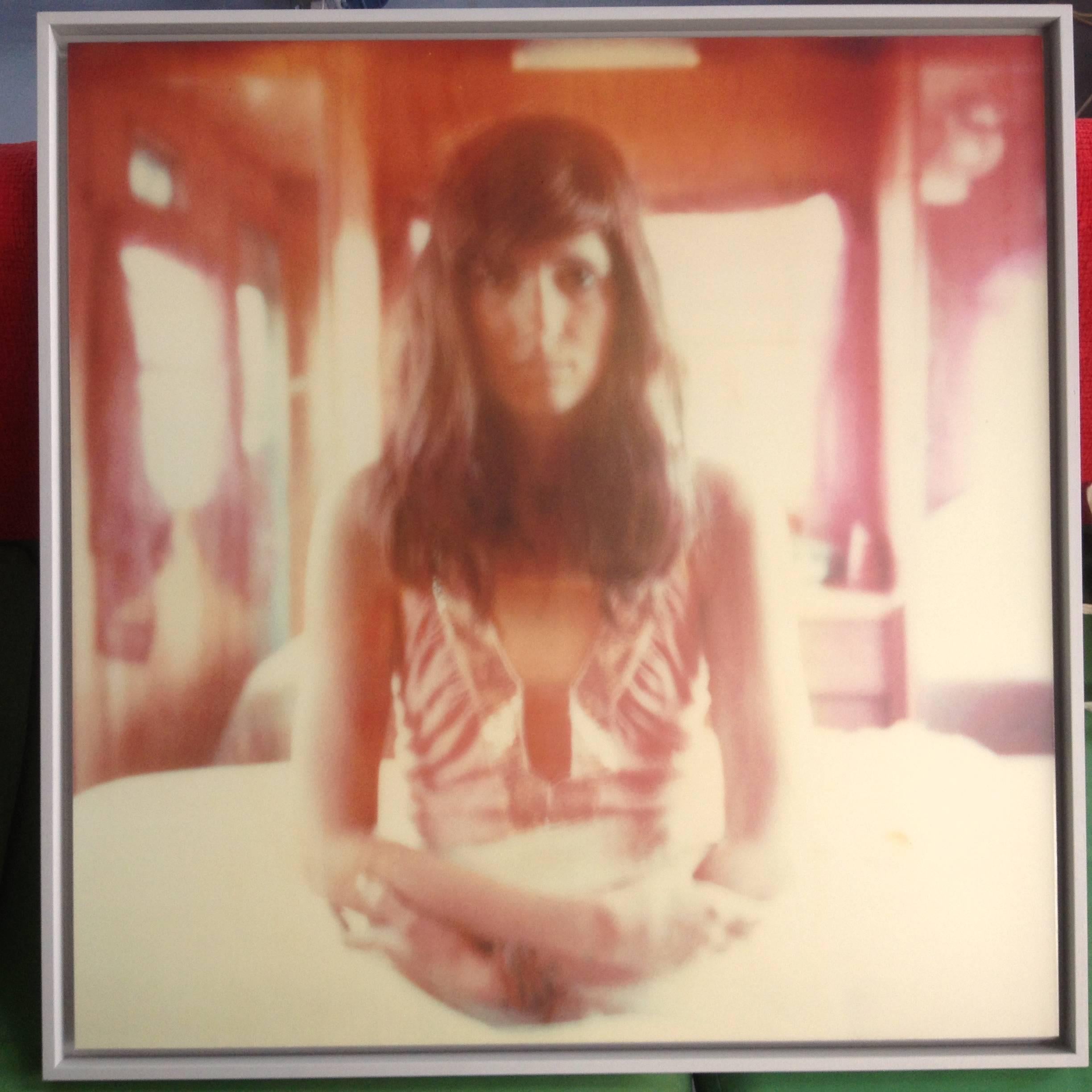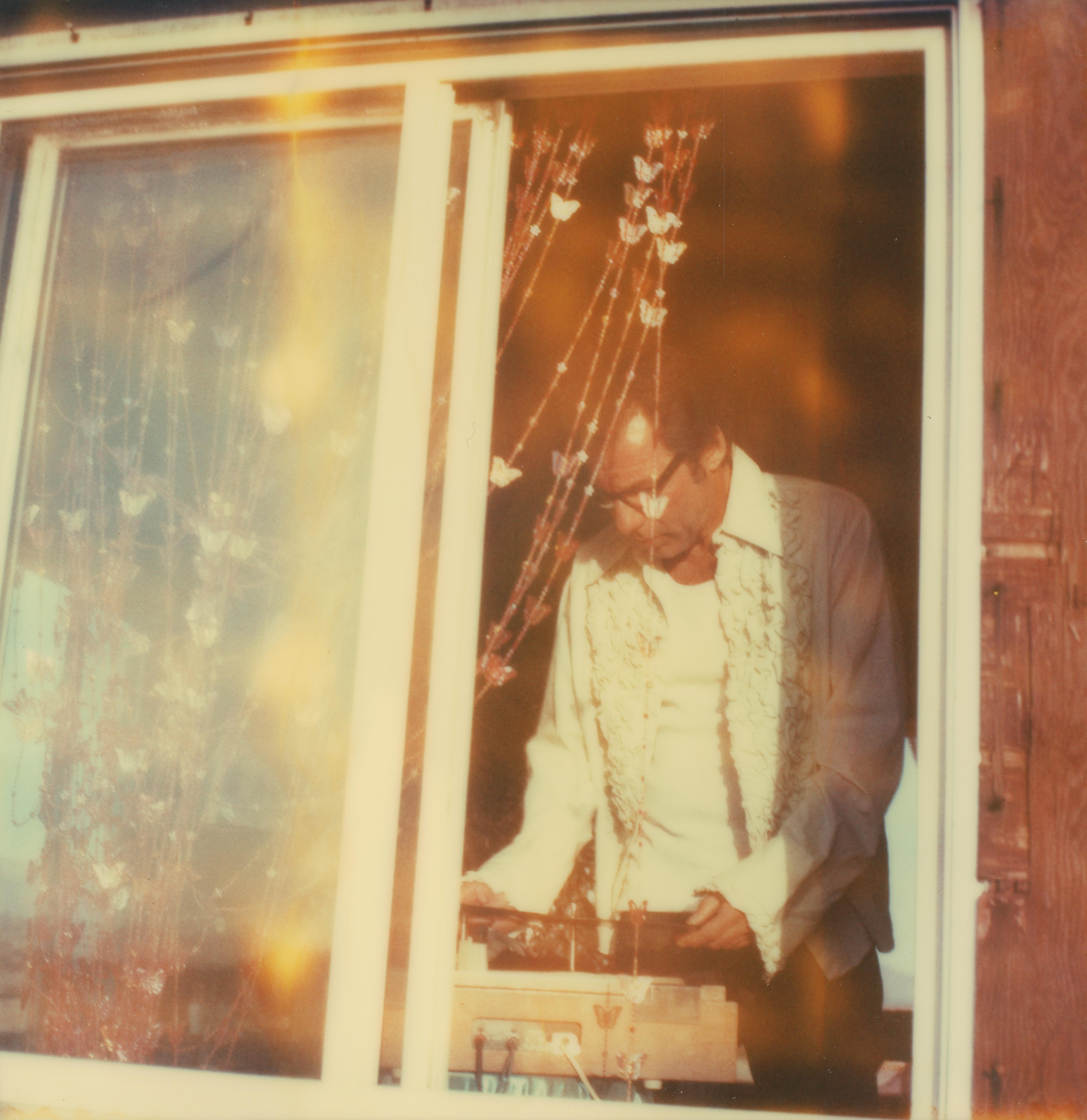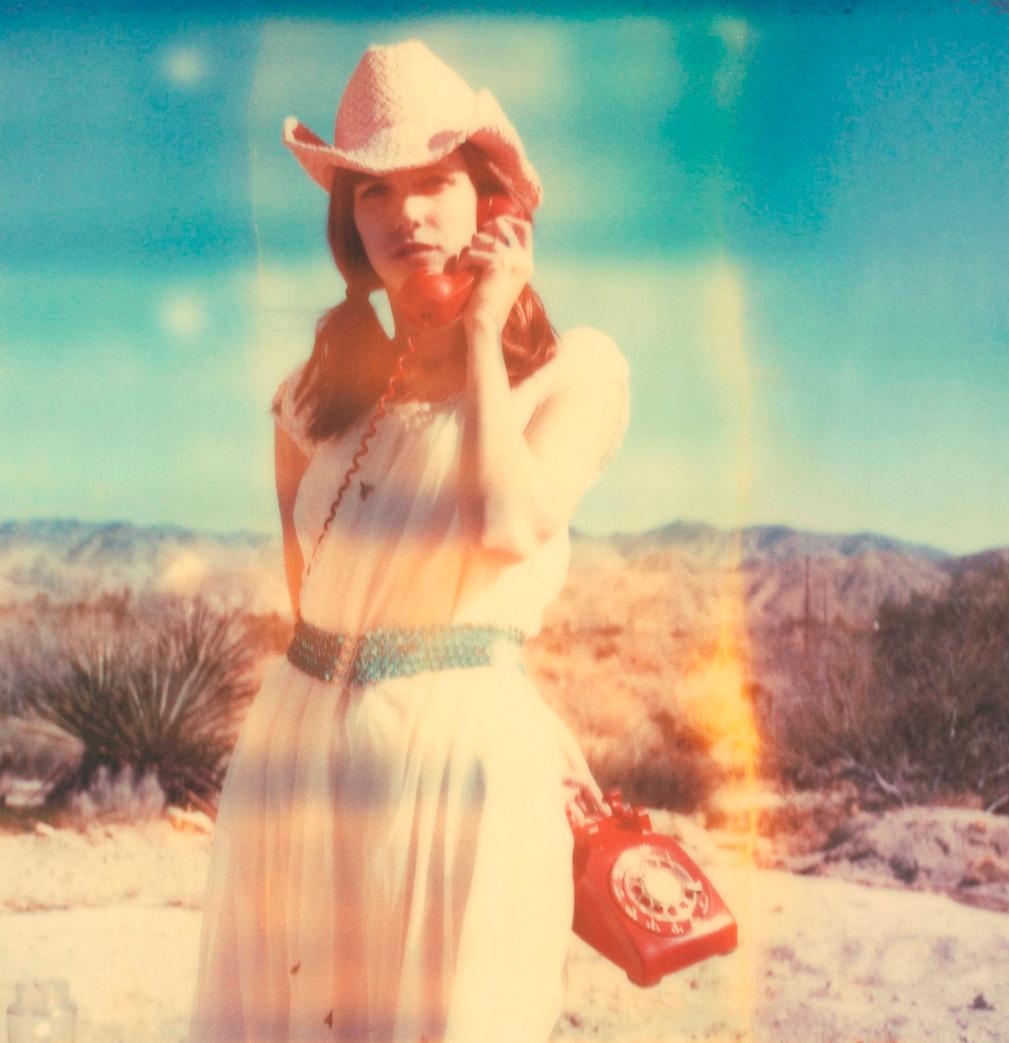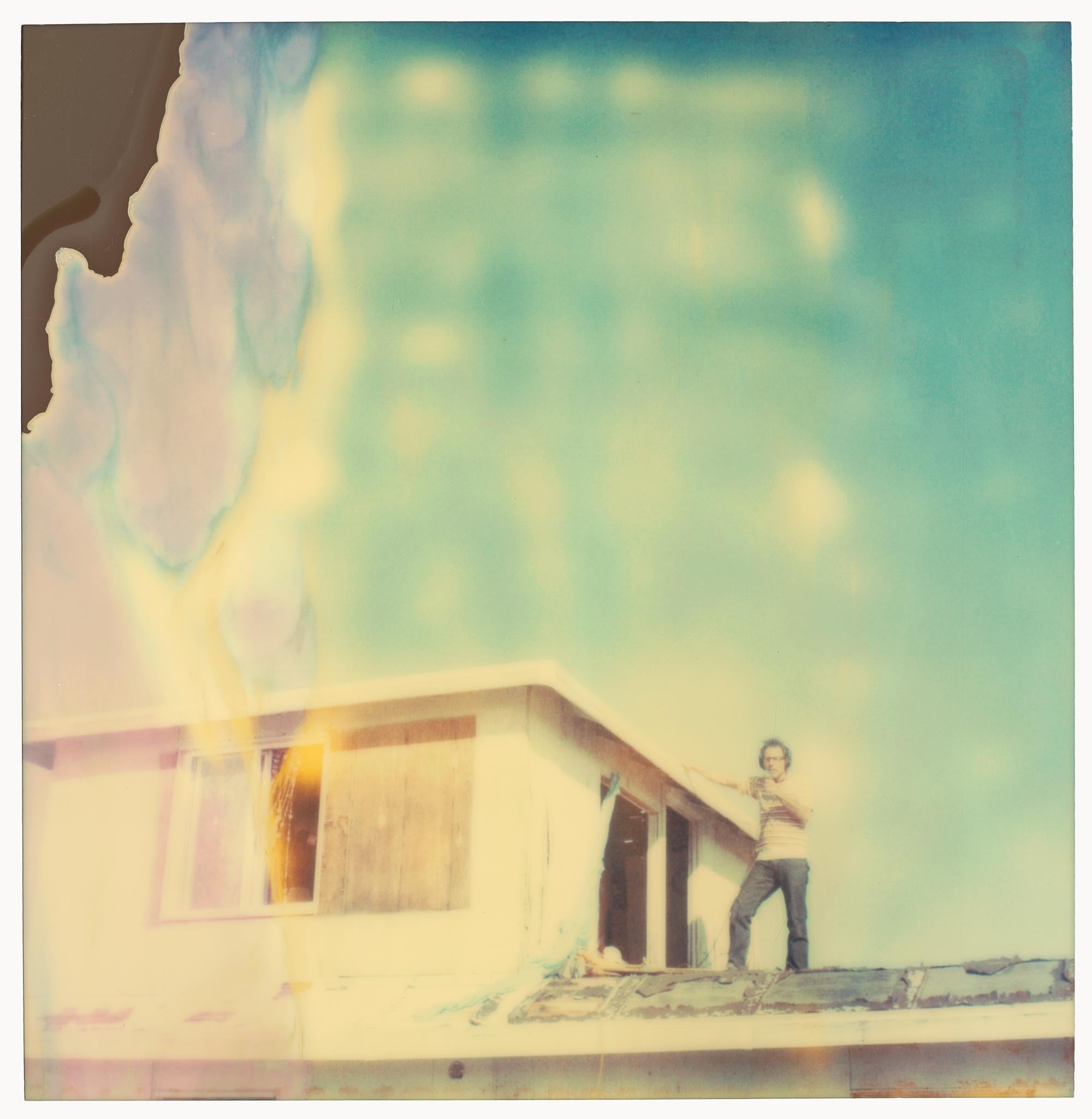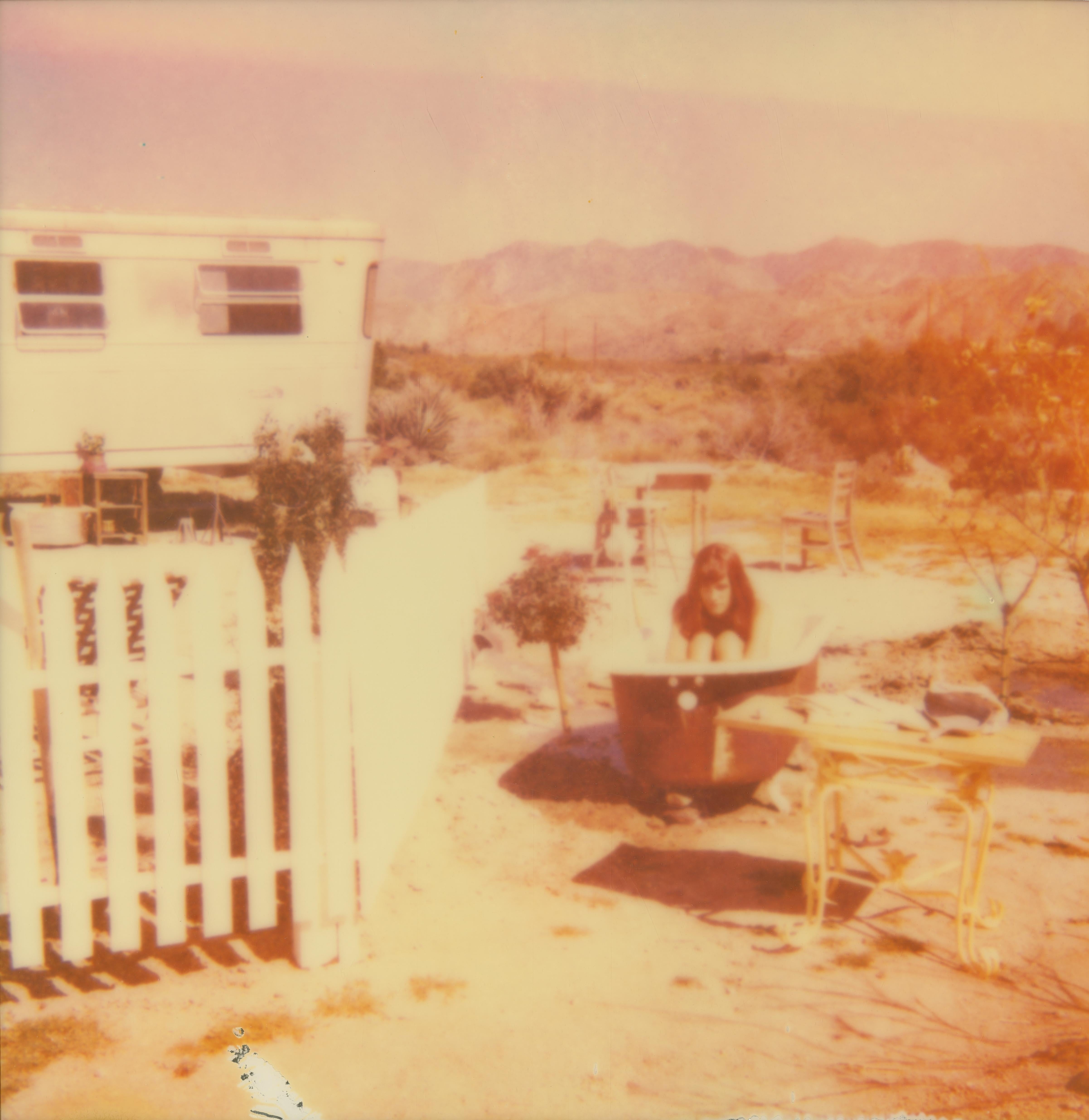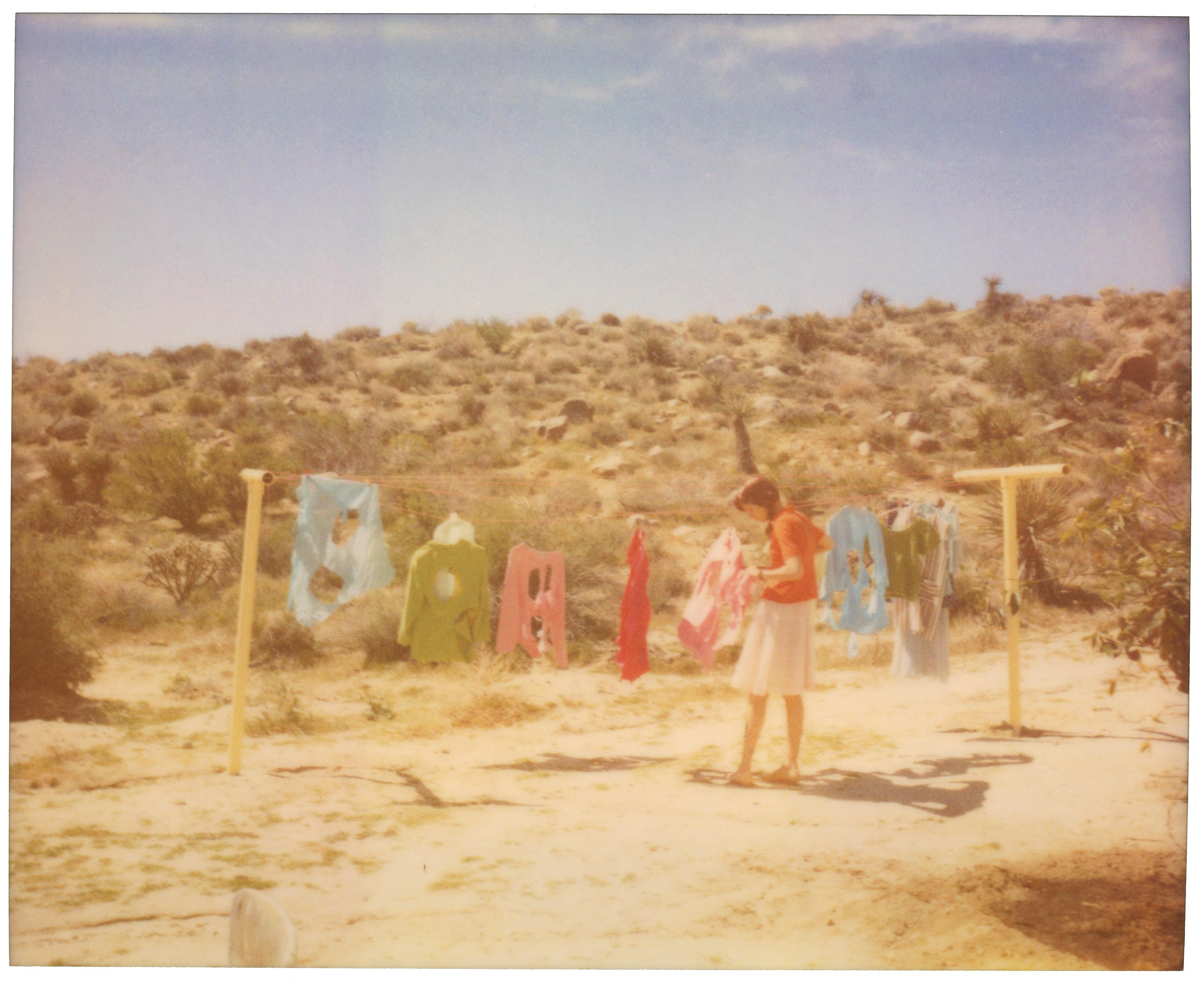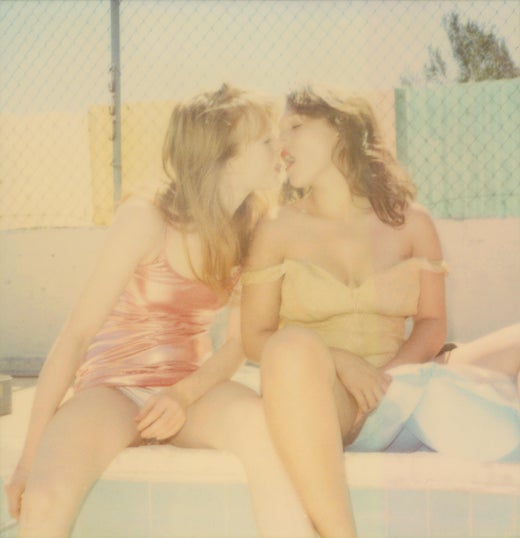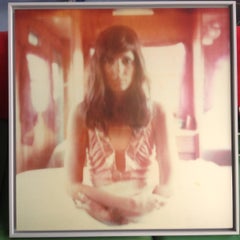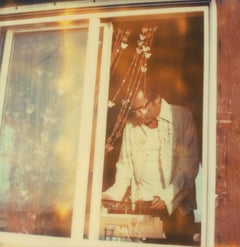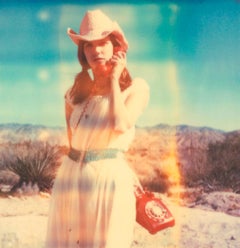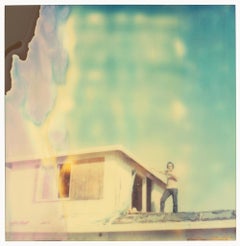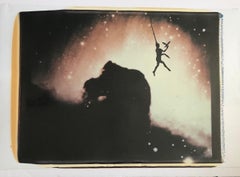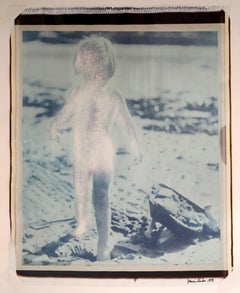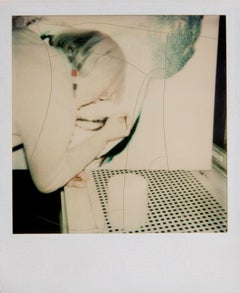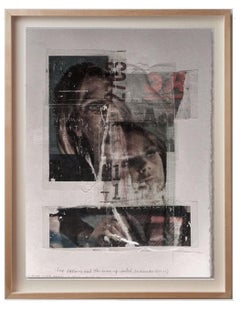Items Similar to The DJ (The Girl behind the White Picket Fence) - Polaroid, 21st Century
Want more images or videos?
Request additional images or videos from the seller
1 of 11
Stefanie SchneiderThe DJ (The Girl behind the White Picket Fence) - Polaroid, 21st Century2013
2013
$900
£682.32
€786.54
CA$1,267.51
A$1,405.57
CHF 738.52
MX$17,173.68
NOK 9,239.93
SEK 8,673.25
DKK 5,871.67
About the Item
The DJ (The Girl behind the White Picket Fence) - 2013
50x50cm,
Edition of 10 plus 2 Artist Proofs.
Archival C-Print, based on the Polaroid.
Mounted on Dibond with matte UV-Protection.
Signed on back and Certificate.
Artist Inventory No. 16346.
In Stefanie Schneider's evocative piece "Her Last Call," she presents a poignant scene featuring the talented actor Heather Megan Christie. The composition centers around a captivating image of Christie holding a red rotary phone receiver to her ear, her gaze fixed directly into the camera. The visual narrative conveys a profound sense of emotion and introspection, inviting viewers into a moment of intimate connection and reflection.
The choice of a rotary phone imbues the scene with a nostalgic quality, evoking memories of a bygone era and a time when communication took on a more tangible and personal form. The act of holding the receiver to her head adds an element of intimacy, as if engaged in a heartfelt conversation or caught in a moment of deep contemplation. The phone becomes a conduit for thoughts, emotions, and personal reflections.
Heather Megan Christie's presence in the image is captivating. Her gaze, directed straight into the camera, evokes a sense of vulnerability, as if she is allowing viewers to glimpse into her inner world. Her expression and body language hold an air of mystery, leaving room for interpretation and personal connection. The juxtaposition of the vintage phone against her contemporary appearance creates a striking contrast, bridging the gap between past and present, nostalgia and modernity.
Through her artistry, Stefanie Schneider elicits a range of emotions and prompts us to reflect on the significance of communication, connection, and the narratives that shape our lives.
- Creator:Stefanie Schneider (1968, German)
- Creation Year:2013
- Dimensions:Height: 19.69 in (50 cm)Width: 19.69 in (50 cm)Depth: 0.4 in (1 cm)
- Medium:
- Movement & Style:
- Period:
- Condition:
- Gallery Location:Morongo Valley, CA
- Reference Number:1stDibs: LU652312831732
Stefanie Schneider
Stefanie Schneider received her MFA in Communication Design at the Folkwang Schule Essen, Germany. Her work has been shown at the Museum for Photography, Braunschweig, Museum für Kommunikation, Berlin, the Institut für Neue Medien, Frankfurt, the Nassauischer Kunstverein, Wiesbaden, Kunstverein Bielefeld, Museum für Moderne Kunst Passau, Les Rencontres d'Arles, Foto -Triennale Esslingen., Bombay Beach Biennale 2018, 2019.
About the Seller
4.9
Platinum Seller
Premium sellers with a 4.7+ rating and 24-hour response times
Established in 1996
1stDibs seller since 2017
1,037 sales on 1stDibs
Typical response time: 2 hours
- ShippingRetrieving quote...Shipping from: Morongo Valley, CA
- Return Policy
Authenticity Guarantee
In the unlikely event there’s an issue with an item’s authenticity, contact us within 1 year for a full refund. DetailsMoney-Back Guarantee
If your item is not as described, is damaged in transit, or does not arrive, contact us within 7 days for a full refund. Details24-Hour Cancellation
You have a 24-hour grace period in which to reconsider your purchase, with no questions asked.Vetted Professional Sellers
Our world-class sellers must adhere to strict standards for service and quality, maintaining the integrity of our listings.Price-Match Guarantee
If you find that a seller listed the same item for a lower price elsewhere, we’ll match it.Trusted Global Delivery
Our best-in-class carrier network provides specialized shipping options worldwide, including custom delivery.More From This Seller
View AllGravity (The Girl behind the White Picket Fence) - Polaroid, Contemporary, Color
By Stefanie Schneider
Located in Morongo Valley, CA
Gravity (The Girl behind the White Picket Fence) - 2013
80x80cm,
Edition 2/5.
Analog C-Print printed on Fuji Archive Paper, hand-printed by the artist,
based on the Polaroid.
Mou...
Category
2010s Contemporary Color Photography
Materials
Wood, Archival Paper, Photographic Paper, C Print, Color, Polaroid
A love song (The Girl behind the White Picket Fence) - Polaroid
By Stefanie Schneider
Located in Morongo Valley, CA
A love song (The Girl behind the White Picket Fence) (The Girl behind the White Picket Fence) - 2013
20x20cm, (ask about a larger sized edition)
Edition of 10,
Archival C-Print, ba...
Category
2010s Contemporary Color Photography
Materials
Archival Paper, Photographic Paper, C Print, Color, Polaroid
'Her last Call III' (The Girl behind the White Picket Fence) - Polaroid
By Stefanie Schneider
Located in Morongo Valley, CA
'Her last Call III' (The Girl behind the White Picket Fence) - 2008
20x24cm,
Edition of 10,
Archival C-Print, based on the Polaroid.
Certificate and Signature label.
Artist Inv...
Category
Early 2000s Contemporary Color Photography
Materials
Photographic Film, Archival Paper, C Print, Color, Polaroid
Good Times (The Girl behind the White Picket Fence)
By Stefanie Schneider
Located in Morongo Valley, CA
Good Times (The Girl Behind the White Picket Fence) - 2014
50x49cm,
Edition of 10 plus 2 Artist Proofs.
Archival C-Print, based on the original Polaroid.
Certificate and Signature...
Category
2010s Contemporary Color Photography
Materials
Archival Paper, Photographic Paper, C Print, Color, Polaroid
The Girl I (The Girl behind the White Picket Fence) - Contemporary, Polaroid
By Stefanie Schneider
Located in Morongo Valley, CA
The Girl III (The Girl behind the White Picket Fence) - 2013
38x36cm,
Edition of 10.
Analog C-Print, hand-printed by the artist on Fuji Archive Crystal Paper, matte surface,
base...
Category
2010s Contemporary Color Photography
Materials
Archival Paper, Photographic Paper, C Print, Color, Polaroid
Side Effects (The Girl behind the White Picket Fence) - Polaroid, Portrait
By Stefanie Schneider
Located in Morongo Valley, CA
Side Effects (The Girl Behind the White Picket Fence) - 2013
20x24cm,
Edition of 10, plus 2 Artist Proofs.
Archival C-Print, based on the original Polaroid.
Signature label and certificate.
Artist Inventory #13303.
Not mounted.
Offered is a piece from the movie: The Girl Behind the White Picket Fence. Written and directed by Stefanie Schneider
A tale told with blemished and expired Polaroid film about the hopes and dreams of a newly orphaned girl after losing her parents who lived in the Californian desert in an old travel trailer.
-filmed with Polaroid film stock and Super-8 footage, overlaid with poetic voice-over monologue - this feature film creates a dynamic kaleidoscope of words and pictures, a dreamy tale that channels Terrence Malick, Gus Van Sant, and pages torn from a lonely girl's journal.
(Palms Springs life magazine / Caroline Ryder)
Stefanie Schneider
By Caroline Ryder
Inside the trailer are period accents—a vintage radio, vintage fridge, little crocheted doilies, and dusty gilt-framed photographs. It’s a surreal home-sweet-home, an Americana fantasy as imagined by German artist and experimental filmmaker Stefanie Schneider whose work is so inspired by the desert landscape, she made it her home in 2005. “There’s a completely different light here than in Germany, a beautiful light,” says Schneider, whose property in Morongo is dotted with vintage trailers. They surround her midcentury home and serve as sets for her photoshoots or as guest lodgings for her friends from Hollywood and Berlin. “But what I really love about the desert is the desolation,” she continues. “The sense of hope for something that might or might not come. It’s easy to see our dreams projected in the desert.”
Famed for shooting trailer park chic fine art photographs exclusively on vintage Polaroid film, Schneider recently completed her most ambitious project to date—a feature film made entirely of Polaroid stills (4000 images in total), the story set around her magnificent 1950s trailer. The film, called “The Girl Behind The White Picket Fence” tells the story of a broken-hearted girl who lives in the trailer. Her name is Heather, and she is played by model Heather Megan Christie, girlfriend of actor Joaquin Phoenix, and former partner of Red Hot Chili Peppers singer Anthony Kiedis, with whom she has a son. Heather stars opposite Kyle Larson (who plays ‘Hank’), a real-life gypsy fisherman who catches crab in Alaska when he’s not surfing in Southern California. Neither of the two had ever acted before, and never in the history of movie-making has a director shot a film entirely on Polaroid film.
“There was great difficulty shooting a film this way,” says Schneider, who, with her long straight hair, wide innocent eyes, and thick-framed glasses, conjures an art-house Gretel. “If I had used a regular camera I would have had 36 exposures per minute, much faster and easier than using the old Polaroid camera which takes a long time to shoot one frame. Also, sometimes it doesn’t shoot at the exact moment you think it’s going to—but that’s really great because then you miss the perfect moment…and often those are the best shots.” Individually, the Polaroid photographs that comprise 29 PALMS, CA stand alone, but together and in sequence, filmed with super 8 and 16mm film stock and overlaid with poetic voice-over monologues, they create a dynamic kaleidoscope of words and pictures, a dreamy tale that channels Terrence Malick. Gus Van Sant, and pages torn from a lonely girl’s journal.
The idea to shoot a movie in this way came about in 2004 when Schneider was working with leading German director Mark Forster (Monster’s Ball, Finding Neverland, Quantum of Solace) on his film Stay. She had met Forster at director Wim Wender’s birthday party in Hollywood. A few years later, Forster asked Schneider to shoot Polaroids of scenes from Stay as he filmed; he used those photographs for dream and memory sequences in the movie. For the first time, Schneider saw her Polaroids strung together in sequence, moving with rhythm like a flipbook, in the context of a story. When Forster urged her to consider making a feature film using that technique, the seed of 29 PALMS, CA was sown. She mentioned the idea to her good friend German actor Udo Kier, who also gave the idea a big thumbs up, and agreed to play the part of a mysterious shaman in the film.
Thanks to her strong reputation in the art world and her Hollywood connections, getting talented people on board was the easy part (for a while, Charlotte Gainsbourg was pegged to play the starring role, although she pulled out two weeks before shooting commenced because she was pregnant and not fit to travel to the desert.) The hard part was finding the perfect trailer—and bringing it to the desert. “This trailer almost killed us,” says Schneider’s partner Lance Waterman, who lives and works with Schneider in Morongo Valley. After finding it on eBay, the couple drove to Utah to pick it up, the plan being to tow it all the way back to the high desert themselves. Bad idea. “We were driving down a hill with this enormous trailer behind us when we realized that if we wanted to stop, there would be no way to do so without the trailer crushing us,” says Waterman. Adds Schneider: “Lance was even giving me instructions on how to jump out of the truck if we needed to.” Thankfully the road leveled and as soon as they were able to slow down and pull over, they called a professional towing company, which transported the trailer the remaining distance to Morongo Valley.
Filming took place in Spring 2011 and 2012. Schneider recently submitted the film to major film festivals in Europe and the US, and it will be broadcast in 2013 by leading German television channel, Arte. While Schneider may come from a long tradition of photographers-turned-filmmakers—Stanley Kubrick started out as a photographer, as did Ken Russell (Tommy, Women in Love) and Larry Clark, who was a controversial fine art photographer before directing smash hit Kids—she does not see her future in Hollywood, directing blockbusters. Not necessarily. “I don’t think I want to make more films,” she says. “The actors were saying they would love to work with me again, and were asking if I would like to make other movies. But being on movie sets is far too stressful, and at least with this, I was in complete power of what was going on creatively. That said, if this gets a lot of acclaims…we can always think again. One should never say never.”
Film features
original soundtrack with songs by Adam Weiss, Daisy McCrackin, Billy Harvey, Sophie Huber, Zoe Bicat, Max Sharam, Cheyenne Randall...
Category
2010s Contemporary Color Photography
Materials
Archival Paper, Photographic Paper, C Print, Color, Polaroid
You May Also Like
Vintage 20X24 Format Polaroid Signed Surrealist Photograph Eve Sonneman Photo
By Eve Sonneman
Located in Surfside, FL
This is from a show at Sidney Janis Gallery and is from the estate of Joan Sonnabend.
Eve Sonneman (born in Chicago on 1946) is an American photographer and artist. She did a series ...
Category
1990s Contemporary Color Photography
Materials
Color, Polaroid
Large Format Vintage Color 20X24 Polaroid "Radiant Child" signed and dated
By Dennis Farber
Located in Surfside, FL
30X26 with Mat. (20X24 inch polaroid) From The New York Times: Dennis Farber abducts children from photographic illustrations in children's books of the 30's. He paints Ku Klux Klan costumes on some toddlers at a birthday party, as if he could see their character and future by the light of the birthday candles...
Category
1980s Figurative Photography
Materials
Photographic Paper
Polaroid of Andy Warhol Painting
By Andy Warhol
Located in Beverly Hills, CA
This work is unique photographic work taken under the direction of Andy Warhol.
Provenance: Gift of the artist, to the personal collection of Ronnie Cutrone to the current owner
Wo...
Category
1980s Pop Art Color Photography
Materials
Polaroid
Faded Polaroids, Mixed Media Collage Portrait
By Roberto Fonfria
Located in Miami Beach, FL
Fonfria's work explores human behavior and social rules with a critical eye and humor, touching on personal themes such as dreams, fears, and memories. The images come from old magaz...
Category
2010s Pop Art Mixed Media
Materials
Cotton, Paper, Mixed Media, Graphite
Vintage Ektacolor Color Photograph Untitled Memory Projection Photo Shimon Attie
By Shimon Attie
Located in Surfside, FL
Shimon Attie (American, b. 1957), Untitled Memory (Projection of Marsha A.)
Ektacolor photograph, 1998, from the Untitled Memory series,
Gallery label to verso, Jack Shainman Gallery, New York matted and framed.
Frame dimensions 27 3/4 x 32 1/4 in, photo 25 X 31
Provenance: from the Estate of the late Ron and Anne Dees, Fayetteville, North Carolina
Ron and Anne Dees were longtime collectors, lovers, and patrons of art. Starting in the late 1990s, they began their art acquisition and collection, focusing substantially on contemporary art. Their affinity for art went far beyond simply collecting and displaying. Ron served as a docent at the esteemed Corcoran Gallery of Art in Washington, DC, from the late 1990s into the 2000s.
In the series "Untitled Memory," Attie revisited his former (and then-deserted) apartment in San Francisco, projecting black-and-white snapshots of his friends and family in spaces that they previously occupied. The desaturated figures have a specter-like appearance and are often depicted in repose or rest, as if in a perpetual state of waiting. The juxtaposition between the projected images and the empty rooms reminds viewers of the fragility of memory, and how sites are activated/changed by presence and absence.
Shimon Attie (born Los Angeles in 1957) is an American visual artist. He was awarded a Guggenheim Fellowship in 2008, The Rome Prize in 2001 and a Visual Artist Fellowship from Harvard University's Radcliffe Institute for Advance Study in 2007. His work spans a variety of media, including photography, site-specific installation, multiple channel immersive video installation, performance, and new media. Much of Attie's practice explores how a wide range of contemporary media may be used to re-imagine new relationships between space, time, place, and identity. Much, though not all, of Attie's work in the 90s dealt with the history of the second world war. He first garnered significant international attention by slide projecting images of past Jewish life onto contemporary locations in Berlin. More recent projects have involved using a range of media to engage local communities to find new ways of representing their history, memory and potential futures. Attie's artworks and interventions are site-specific and immersive in nature, and tend to engage subject matter that is both social, political and psychological. In 2013, Five monographs have been published on Attie's work, which has also been the subject of a number of films, which have aired on PBS, BBC, and ARD. Since receiving his MFA Degree in 1991, Attie has realized approximately 25 major projects in ten countries around the world. Most recently, in 2013-14, Shimon Attie was awarded the Lee Krasner Lifetime Achievement Award in Art.
He was born in 1957 and received an MFA in 1991. In 1991 he moved to Germany from his previous home in Northern California, and began to make work initially about Jewish identity and the history of the second world war. His work later evolved to engage broader issues of memory, place and identity more generally. Shimon Attie moved to New York City in 1997.
Shimon Attie's work has been extensively reviewed by a wide variety of publications, including features and/or reviews in The New York Times, The Washington Post, The Los Angeles Times, Art in America, Art News, Art Forum, The Village Voice, The Boston Globe, and many others.
Yasaman Alipour, writing in "The Brooklyn Rail: Critical Perspectives on Arts, Politics, and Culture", on Shimon Attie's solo exhibition "Facts on the Ground" at Jack Shainman Gallery in New York City:
Attie achieves something profound: he presents a unique opportunity to contemplate Israel/Palestine without the distraction that is simultaneously a manifestation of the limitations of visual of written language and the possibilities of their alliance."
Norman Kleeblatt, writing in a cover story for "Art in America"
"Like many other artists in the wake of Marcel Broodthaers...
Category
1990s Conceptual Color Photography
Materials
Color
Untitled (Aiden 12), Polaroid Transfer by Mark Beard
By Mark Beard
Located in New York, NY
This polaroid transfer by Mark Beard is offered by CLAMP in New York City.
Category
1990s Contemporary Photography
Materials
Archival Paper, Polaroid
